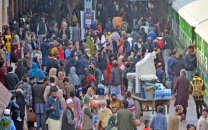The missing link
Pakistan has already lost its market share in Afghanistan to India in pharmaceuticals

The writer served as Executive Editor of The Express Tribune from 2009 to 2014
What is, however, missing from this connectivity chart is an east-northwest overland trade corridor, linking India to Afghanistan and Central Asia through Pakistan. Of course, the idea would look out of place to many at this point in time as relations between India and Pakistan are too frosty currently and on the other hand border tension between Pakistan and Afghanistan is getting too hot for mutual comfort.
But it would not appear to be such a far-fetched idea if one were to check it against the 2013 election manifesto of the ruling PML-N, which had envisioned Pakistan playing the role of a bridge between energy-rich Central Asia and Iran on one side, and energy-deficit countries like China and India on the other as “Pakistan is located at an important junction of South Asia, West Asia and Central Asia”.
Continuing, the PML-N manifesto had said that Pakistan’s coastal belt facilitated access to warm waters and the oil-rich Gulf, as well as international oil supply lines passing through the Strait of Hurmuz, allowing Pakistan to develop a flourishing transit economy because it provides the shortest land routes from western China to the Arabian Sea, through Gwadar Port, “while linking India with Afghanistan and Central Asian Republics (CARs) and providing land route from Iran to India and access to the CARs to the Arabian Sea and India for oil and gas pipelines”.
Notwithstanding the PML-N manifesto, Pakistan, even during normal times, has consistently refused to allow the facility to India and Afghanistan while Afghanistan on the other hand has consistently insisted that India must be part of the transit trade agreement in the same way as Pakistan uses Afghan soil to reach Central Asian states. Because of our foot-dragging on the issue, Kabul appears to have lost interest in transit trade through Pakistan and is eager to develop an alternative route via Iran. This development could possibly mean that Pakistan would lose a great opportunity to build strategic trade ties with regional countries. Perhaps Pakistan fears that a free run to Indian goods containers across the country would open new avenues of smuggling causing serious damage to our economy. Also, the possibility of Indian intelligence misusing the facility to undermine Pakistan’s security is not being ruled out. Moreover, there is also the fear that India, once it gets quicker access to Afghanistan and Central Asia, could wipe us out of these markets, considering its level of economic strength relative to Pakistan’s.
Pakistan has already lost its market share in Afghanistan to India in pharmaceuticals. Pharmaceuticals are also Pakistan’s top-performing exports to CARs. India also exports pharmaceuticals to CARs. If Pakistan provides a transit route to India for its exports to Afghanistan, cheaper pharmaceuticals of Indian origin can then be re-exported to CARs capturing Pakistan’s market share in these countries. Therefore, under the circumstances, there seem to be clear economic disadvantages to Pakistan in extending the transit facility to India without adequate safeguards and preferably a quid pro quo, be it political or economic or both. And here perhaps lies the answer to the problem. Let us make an offer to the two countries and tempt them to the negotiating table for talks on a give-and-take basis. The economic quid pro quo could be sharing of the pharmaceutical markets in Afghanistan and Central Asia through joint ventures as well as producing low-cost indigenous pharmaceuticals by using inexpensive raw material from India imported at economical freight cost compared to imports from distant sources.
The issues of smuggling and the Indian intelligence misusing the facility to undermine our security would quickly turn into non-issues as India, once it gets the facility, would itself be careful not to upset the apple cart and lose the lucrative markets of Central Asia. Moreover, the presence of China in the vicinity would discourage India from indulging in any misadventure even if that is what the US would want it to do to undermine Chinese economic ‘expansionism’.
Published in The Express Tribune, July 2nd, 2016.
Like Opinion & Editorial on Facebook, follow @ETOpEd on Twitter to receive all updates on all our daily pieces.



















COMMENTS
Comments are moderated and generally will be posted if they are on-topic and not abusive.
For more information, please see our Comments FAQ